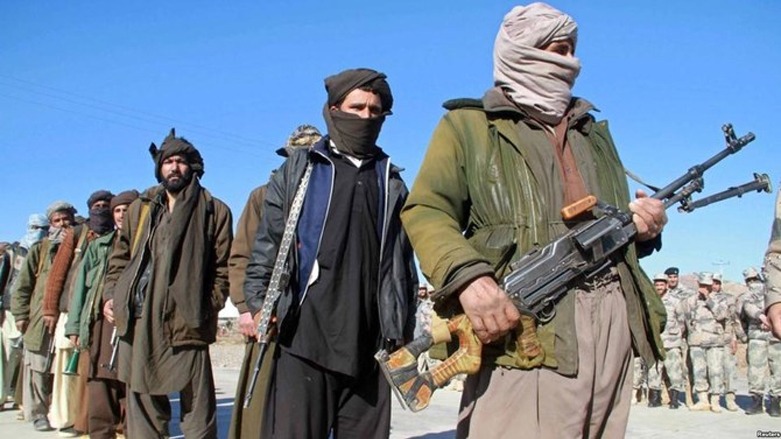US prepared to work with Taliban against ISIS-K in Afghanistan

WASHINGTON DC (Kurdistan 24) — State Department Spokesperson Ned Price told journalists on Tuesday that the Biden administration was prepared to work with the Taliban to counter ISIS-K.
Price’s statement follows three months after the US and other NATO countries completed a chaotic withdrawal of their forces from the central Asian country, where they had been fighting for the past two decades.
Those two decades stand in contrast to the assessment of the Bush administration, which launched the “war on terror” following the Sept. 11, 2001, attacks. Already in December 2001—after just three months of fighting—it believed that it had won in Afghanistan.
That was not simply the White House view, but that of the US agencies involved, including the CIA and Pentagon. Of course, as the past 20 years have made clear, that was quite wrong.
Growing ISIS-K Threat
The ISIS-K threat in Afghanistan has grown significantly since the Taliban took power at the end of August. In part, that is their own doing. As the Taliban gained control of territory, they indiscriminately released prisoners—some of them were Taliban, others were ISIS-K.
Thus, the Taliban has “expanded its shadowy war against the Islamic State branch in Afghanistan, deploying hundreds more fighters” to Nangarhar Province, in the east of the country, where ISIS-K is strongest, The Washington Post reported on Tuesday.
The Taliban employ brutal, heavy-handed tactics, but they may well be backfiring against them, the Post explained. Often, after the Taliban kill an ISIS-K fighter, they hang the body in the street, while “dozens of accused collaborators” have been beheaded.
Yet “violence has only increased,” and some residents and former Afghan government officials told the Post that such tactics were facilitating ISIS-K recruitment.
Part of the problem is that the Taliban come from the south—Kandahar—and they do not know the east of the country.
“These Taliban fighters are not familiar with the province, and they have no way to check the intelligence they receive about [ISIS-K] targets,” a local resident and former civil society activist told the Post. “So they just go after anyone they suspect, kill them and say that person was Daesh.”
Some residents “describe the Taliban raids as more brutal than those carried out by the United States and its Afghan allies,” the paper said.
Indeed, the US military takes extensive steps to avoid civilian casualties, although inevitably some occur. A decade ago, this reporter served as a cultural advisor to the US military in Afghanistan.
The Afghan population was generally understanding of the US mistakes, as I learned then. They were far more angry and resentful of the Taliban and its indiscriminate use of violence.
US is “Pragmatic,” Ready to Work with Taliban to Pursue Key Interests
Asked on Tuesday about the growing strength of the terrorist organization, Price affirmed that the US remains “committed to countering ISIS-K and ensuring that Afghanistan never again becomes a safe haven for terrorism.”
Price laid out the ways that Washington is dealing with the growing threat from ISIS-K, now that it no longer has forces in Afghanistan. Those measures include “working with our international partners, including under the auspices of the Global Coalition to Defeat ISIS.”
That coalition was originally established to combat ISIS in Syria, where it first emerged, and in Iraq, into which it crossed in the summer of 2014, threatening both Baghdad and Erbil.
On Monday, for the first time, the State and Treasury Departments issued sanctions against four ISIS-K figures.
Price also said that Washington was working “to deter foreign terrorist fighters from reaching Afghanistan and the region,” while “using multiple tools to counter ISIS-K’s pernicious ideology.”
It was not clear how those vague steps would have a significant impact, and the key point in the US approach to confronting ISIS-K appeared at the end of Price’s statement: coordination with the Taliban.
“We have consistently said we are prepared to engage the Taliban on a practical, pragmatic basis on areas of core national interest to us,” he said.
“Of course, counterterrorism and seeing to it that Afghanistan can never again be used as a launchpad for international attacks is a core national interest,” he continued. “So we have remained in contact with the Taliban on these issues.”
Price explained that Tom West, who has replaced Zalmay Khalilzad as Special Representative for Afghanistan, would return to Doha following the Thanksgiving holiday for two weeks of meetings with Taliban leaders in the Qatari capital.
In addition to coordination in fighting ISIS-K, West will discuss a second core issue of US concern: facilitating the safe exit of those Afghans entitled to US residence.
Finally, the US is offering the Taliban a carrot to encourage cooperation: humanitarian aid. As Price noted the US has “pledged $474 million in this year alone,” while it has the authority to grant “specific and general licenses” for humanitarian assistance.
However, that assistance has been suspended since the Taliban takeover. Last week, Deborah Lyons, the UN Secretary-General’s Special Representative and Head of the UN Assistance Mission in Afghanistan (UNAMA), cautioned the Security Council that, with winter looming, the country faces a humanitarian crisis, as she warned of widespread food insecurity and even famine.
